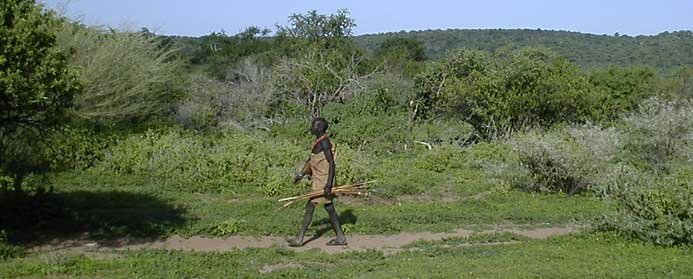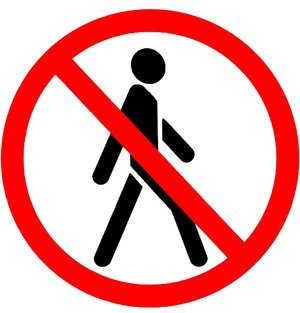room to move
Hadza bushman, Tanzania 2000
As if you didn’t have enough to worry about, I’m going to add yet another conundrum to your list. It’s got a strange name and it sure isn’t getting much attention in the world of health and medicine, but it’s profoundly important, maybe even more important than the familiar elements of diet and exercise. The problem is our vanishing vagility, the ability of an organism to move about freely in habitat. A new and growing field called movement ecology studies the movement of wildlife and how it’s often restricted by freeways, fences and developments. A recent discussion appeared in the New York Times: Animals Are Losing Their Vagility, or Ability to Roam Freely.
The loss of vagility is a serious concern for wild creatures, but lost in the conversation is the fact that humans are losing their vagility too, with serious mind-body consequences. Ask yourself: How far can I walk right now, in any direction? Chances are, not very far at all. Even if you aren’t stopped short by fences or roadways, you’re almost certain to be crossing onto someone else’s property. If you live in an urban area, your vagility is measured not in miles, but in feet. The only true freedom of movement we now enjoy is in selected parks or if you’re really lucky, a big tract of private property. In the US, we like to declare that we live in a free country, but in terms of physical movement, that’s simply not the case. We’ve fenced and boxed ourselves in. Historically speaking, this condition is profoundly abnormal.
To get a sense of normal human freedom as experienced by our hunting and gathering ancestors, imagine that you could walk wherever you desired, free to turn right or left at will. The only constraints on your movement would be natural terrain, vegetation, lakes, swamps or raging rivers. Our ancestors experienced this freedom every single day of their lives and it’s safe to say that this experience worked in harmony with the human brain. The human nervous system, sculpted by thousands of generations of true vagility, is finely tuned for the exploration of natural terrain. But today, we almost never experience this physical freedom. In short, we’re experiencing a vagility deficit disorder.
Car companies know all about our craving for vagility and play on it in thousands of ads. The lure of a powerful car on an open road speaks to our deep, hunter-gatherer ancestry, but it’s a false promise. No matter how gorgeous the scenery, your body is still trapped inside a steel and plastic box. You can turn left or right at intersections, but you’re still confined to a tyrannical strip of asphalt, and the road is likely to be crawling with vehicles. Even if your car performs as advertised, your body is still trapped. Strictly speaking, you’ve got less true vagility than an inmate in a 10 foot prison cell; at least a prisoner can get up and pace back and forth.
To my knowledge, no one has yet measured the health consequences of shrinking vagility in the human species. But you don’t have to be a biologist or research physician to make some safe guesses as to what they might be. Take any animal that’s evolved for exploring open habitat, limit that animal’s movement and you’re likely to see anxiety, anger, stress and ultimately depression. None of this should come as any great surprise. It’s no wonder that so many of us are suffering in the modern world. To take away an animal’s vagility is to take away its most primal life experience. Less research is needed.
So what’s the antidote to this radical restriction of human vagility? The obvious answer is that we need more room to spread out and walk the land. We need places we can go with unrestricted access and freedom of movement. We need the space to explore and the ability to turn right or left as the body desires. But opportunities for true vagility are shrinking fast. Expanding urban centers metastasize and consume land at a ferocious pace. Most of our public spaces are heavily regulated and domesticated. Even in our biggest national parks, visitors are advised to stay on the roads and trails at all times; wandering is discouraged by physical barriers and regulation.
We try to compensate for our declining vagility and the resulting stress, but no amount of medication, meditation, gym training or wellness programs can substitute for our diminished freedom of movement. So what are we to do? The first solution is recognition – look the issue in the face. Your life and health are being compromised by lanes, boxes, and walls. Your body and spirit are being containerized and domesticated by the modern alien environment. You might well be able to tolerate it for a few years, even a couple of decades, but your body and spirit are going to rebel. In the end, getting out into wild land is just as vital to your health as our more familiar health practices. Exercise is all well and good, but it’s exploration that really feeds us.


